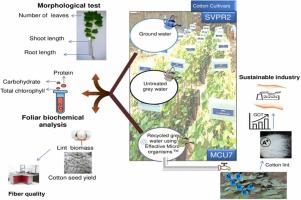Industrial Crops and Products ( IF 5.6 ) Pub Date : 2023-06-01 , DOI: 10.1016/j.indcrop.2023.116921 Lavanya Velmurugan , Rathinabala Kanagaraj , Kannan Dorai Pandian

|
Application of recycled municipal wastewater and industrial effluents using biological treatment methods to industrial crops is an ingenious practice to ensure the combined means of adopting sustainable industrial crops production through sustainable freshwater management. An investigation was made to study the effects of recycled greywater treated using the extended form of Effective Microorganisms in the sewage treatment plant, over the growth, biochemical contents, yield and fiber quality of MCU7 and SVPR2 cotton cultivars, grown under experimental conditions. The efficacy of the recycled greywater treatment was compared with ground well water as control and untreated greywater as on another treatment. Improved yield of lint fiber and cotton seeds were obtained with a ginning out turn (GOT) of 71.66% and 66.1% in the SVPR2 and MCU7 cultivars, respectively, when irrigated with recycled greywater. Similarly, both the cotton cultivars, supplied with the recycled greywater was found with a significantly higher (P ≤ 0.01) stable length (SL) and fiber strength, as well as significantly higher spinning consistency index (SCI) (P ≤ 0.05) and uniformity ratio, when compared with the other two treatments. The novelty approach, adopted in the experiment therefore can be concluded using the recycled greywater to the specific cotton cultivars in water-deficit agro-climatic conditions would be beneficial to sustain the cotton production, would be in turn benefiting the industries.
中文翻译:

使用生物再生灰水测定棉花品种的纤维产量和质量
使用生物处理方法将回收的城市废水和工业废水应用于经济作物是一种巧妙的做法,以确保通过可持续淡水管理采用可持续经济作物生产的组合手段。研究了在污水处理厂使用扩展形式的有效微生物处理的再生灰水对实验条件下种植的 MCU7 和 SVPR2 棉花品种的生长、生化含量、产量和纤维品质的影响。将循环灰水处理的功效与作为对照的地下井水和作为另一种处理的未处理灰水进行比较。SVPR2 和 MCU7 品种的皮棉纤维和棉花种子产量提高,轧花率 (GOT) 分别为 71.66% 和 66.1%,分别,当用回收的灰水灌溉时。同样,发现使用再生灰水的两个棉花品种都具有显着更高 (P ≤ 0.01) 的稳定长度 (SL) 和纤维强度,以及显着更高的纺纱一致性指数 (SCI) (P ≤ 0.05) 和均匀性与其他两种处理相比的比率。因此,在实验中采用的新颖方法可以得出结论,在缺水农业气候条件下将回收的灰水用于特定棉花品种将有利于维持棉花生产,进而使行业受益。以及与其他两种处理相比,显着更高的纺纱一致性指数(SCI)(P≤0.05)和均匀度。因此,在实验中采用的新颖方法可以得出结论,在缺水农业气候条件下将回收的灰水用于特定棉花品种将有利于维持棉花生产,进而使行业受益。以及与其他两种处理相比,显着更高的纺纱一致性指数(SCI)(P≤0.05)和均匀度。因此,在实验中采用的新颖方法可以得出结论,在缺水农业气候条件下将回收的灰水用于特定棉花品种将有利于维持棉花生产,进而使行业受益。











































 京公网安备 11010802027423号
京公网安备 11010802027423号